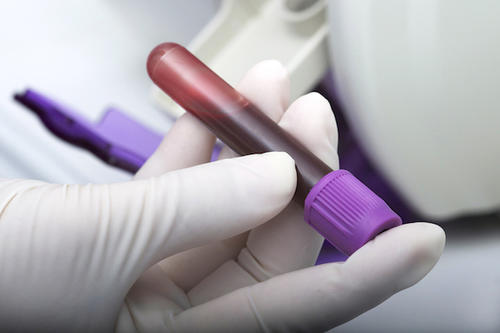
More than 16,000 women die from ovarian cancer each year in the United States. Ovarian cancer is often called the "silent killer" because the symptoms are so vague that women are often not diagnosed with ovarian cancer until the disease has progressed to advanced stages.
Currently, no blood test exists that is adequately sensitive or specific enough to be used to screen women in the general population for ovarian cancer. Studies have shown that using just one protein biomarker at a time is not sufficient to screen women's blood for ovarian cancer.
For this reason, Amy Skubitz, a professor in the University of Minnesota Medical School and Masonic Cancer Center member, and her team at the Ovarian Cancer Early Detection Program, have been using a new technology developed by the Swedish company Olink in which a patient's blood can be tested for the presence of 92 proteins at once. Their findings were recently published in the journal Cancer Prevention Research.
In earlier studies using a small number of blood samples, Skubitz's team had shown this technology worked well for the known ovarian cancer biomarker, CA125. Examining 150 blood samples from women with and without ovarian cancer, Skubitz's team quantified the levels of 92 cancer-related proteins in each patient's blood.
The study found:
- dozens of the cancer-related proteins were present at significantly different levels in the blood of women with ovarian cancer compared to healthy women;
- when a panel consisting of CA125 and five additional proteins were tested, it was possible to tell whether the blood was from a woman with ovarian cancer or from a healthy woman;
- many of the proteins that were found to be differentially expressed between women with ovarian cancer versus healthy women had not been previously recognized as blood biomarkers for ovarian cancer.
“The results from this study take us one step closer to developing a blood-based test for ovarian cancer detection,” said Skubitz. “Ongoing studies in the Ovarian Cancer Early Detection Program are focused on using blood samples from women with early stages of ovarian cancer, as well as from women with benign gynecological diseases.”
Due to the low prevalence of ovarian cancer in the general population, a screening test must be both highly sensitive and highly specific. Therefore, many more blood samples will need to be tested in this platform to determine whether it will hold up for early stages of ovarian cancer. This study focused on serous ovarian cancer, which is considered the most prevalent and the most deadly ovarian cancer. Thus, future studies will also need to include the various other major subtypes of ovarian cancer.
A customized platform that is comprised of ovarian cancer-specific proteins may enable this technology to identify early stages of the disease, which would mean less extensive surgery and less toxic chemotherapy for women diagnosed with ovarian cancer. Detecting ovarian cancer in its earliest stages will translate into a significant improvement in the survival of patients.
The study was funded by the Minnesota Ovarian Cancer Alliance.
- Categories:
- Health




